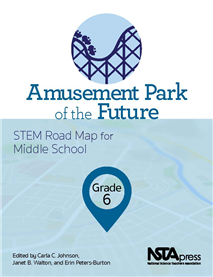All Book Chapters
Book Chapter
Amusement Park of the Future, Grade 6: STEM Road Map for Middle School (Book Sample)
What if you could challenge your sixth graders to design an amusement park for children of tomorrow to safely enjoy? With this volume in the STEM Road Map Curriculum Series, you can! Amusement Park of the Future outlines a journey that will stee...
Book Chapter
Scientists and Engineers Are DREAMERS (Grades 3–5)
In this lesson, students learn that scientists and engineers are dreamers. They read about amateur scientist Luke Howard in the book The Man Who Named the Clouds. After reading, they observe clouds as water-cycle components and learn how clouds help ...
Book Chapter
Scientists and Engineers Are THINKERS (Grades 3–5)
In this lesson, students learn that scientists and engineers are thinkers. They read about inventor Philo Farnsworth in the book The Boy Who Invented TV. After reading, they create a new invention or a replica of an invention from recyclables or ever...
Book Chapter
Scientists and Engineers Are INSPIRED (Grades 3–5)
In this lesson, students learn that scientists and engineers are inspired. They read about inventor Thomas Edison in the book Young Thomas Edison. After reading, they ask Thomas Edison’s three questions at four learning stations that are focused on...
Book Chapter
Scientists and Engineers Are DILIGENT (Grades 3–5)
In this lesson, students learn that scientists and engineers are diligent. They read about inventor George Washington Carver in the book A Picture Book of George Washington Carver. After reading, they will become familiar with six plant parts as they...
Book Chapter
Scientists and Engineers Are IMAGINATIVE (Grades 3–5)
In this lesson, students learn that scientists and engineers are imaginative. They read about scientist Annie Jump Cannon in the book Annie Jump Cannon, Astronomer. After reading, they learn about how Annie Jump Cannon observed variations in the brig...
Book Chapter
Scientists and Engineers Are VISIONARY (Grades 3–5)
In this lesson, students learn that scientists and engineers are visionary. They read about engineer George Washington Ferris Jr. in the book Mr. Ferris and His Wheel. After reading, they create a three-dimensional model of a Ferris wheel and learn h...
Book Chapter
Scientists and Engineers Are PATIENT (Grades 3–5)
In this lesson, students learn that scientists and engineers are patient. They read about scientist Gregor Mendel in the book Gregor Mendel: The Friar Who Grew Peas. After reading, they create a model of inherited traits in a snow-people family to un...
Book Chapter
Scientists and Engineers Are OBSERVANT (Grades 3–5)
In this lesson, students learn that scientists and engineers are observant. They read about primatologist Jane Goodall in the book Jane Goodall’s Life With the Chimps. After reading, they observe crickets and discover how crickets move and communic...
Book Chapter
Scientists and Engineers Are PUZZLERS (Grades 3–5)
In this lesson, students learn that scientists and engineers are puzzlers. They read about Charles Darwin in the book Darwin: With Glimpses Into His Private Journals and Letters. After reading, they become familiar with how plant and animal adaptatio...
Book Chapter
Scientists and Engineers Are INTUITIVE (Grades 3–5)
In this lesson, students learn that scientists and engineers are intuitive. They read about paleontologist Barnum Brown in the book Barnum’s Bones: How Barnum Brown Discovered the Most Famous Dinosaur in the World. After reading, students assume th...
Book Chapter
Scientists and Engineers Are DEDICATED (Grades 3–5)
In this lesson, students learn that scientists and engineers are dedicated. They read about photographer Wilson Bentley in the book Snowflake Bentley. Students learn how Wilson Bentley introduced the world to the hexagonal beauty of snowflakes and ga...
Book Chapter
Scientists and Engineers Are CURIOUS (Grades 3–5)
In this lesson, students learn that scientists and engineers are curious. They read about naturalist John James Audubon in the book The Boy Who Drew Birds: A Story of John James Audubon. After reading, they construct a puppet of a sandhill crane and ...
Book Chapter
Scientists and Engineers Are INNOVATIVE (Grades 3–5)
In this lesson, students learn that scientists and engineers are innovative. They read about inventor Ada Byron Lovelace in the book Ada Byron Lovelace and the Thinking Machine. After reading, they use scientific methods to design, build, and test ai...
Book Chapter
Scientists and Engineers Are COURAGEOUS (Grades 3–5)
In this lesson, students learn that scientists and engineers are courageous. They read about scientist Galileo Galilei in the book Starry Messenger. After reading, they explore lines and curves that are produced by the motion of their bodies. This se...



